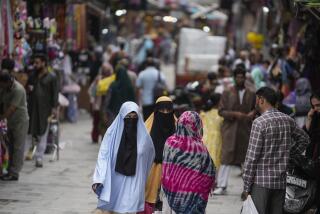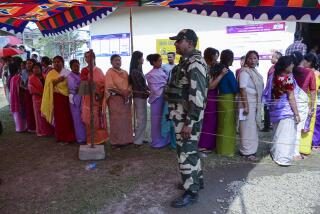Pakistan Holds Local Elections in First Voting Since Military Coup
- Share via
ISLAMABAD, Pakistan — Citizens of this South Asian nation began voting Sunday in staggered local elections seen as a test of the military rulers’ will and ability to restore democracy to the poor country of 140 million people.
When polls closed, some election districts reported a 60% turnout of eligible voters, while others reported barely 35%. Results are not expected to be released for a week.
Sunday’s balloting was the first to take place in Pakistan since the army seized power in a bloodless coup in October 1999. Military ruler Gen. Pervez Musharraf has promised to return Pakistan to democratic rule by the end of 2002. The local elections, to be held until July, are viewed as the first test of his commitment.
Pakistan’s chief election commissioner, Abdul Qadeer Chaudhry, called Sunday’s vote in 18 of Pakistan’s 106 districts “transparent, free and fair.” There are 20,076 seats up for grabs on municipal and district councils.
For the first time, seats have been allocated specifically for women and the poor--a change that the military says will help create a more egalitarian nation. Still, many question whether the newly elected leaders will be prepared for the huge task ahead.
“We have so many problems,” said Allah Rakhi, an elderly woman voting in a small village outside Sargodha, about 160 miles southeast of Islamabad. “We need clean drinking water, [and] electricity is always a problem. Every time we hope.”
For much of its history, Pakistan has been ruled either by the military or by politicians whom the masses have branded as corrupt. Many of these leaders--typically part of the country’s elite--have gained wealth and power; the majority of Pakistanis currently struggle to earn barely $400 a year.
Musharraf took over when the army ousted the civilian government of Nawaz Sharif, who was imprisoned but is now living in exile in Saudi Arabia.
The military accused Sharif and his colleagues of rampant corruption and economic mismanagement.
More to Read
Sign up for Essential California
The most important California stories and recommendations in your inbox every morning.
You may occasionally receive promotional content from the Los Angeles Times.













